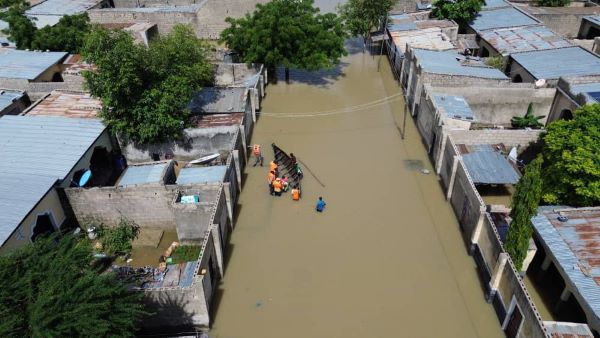The United Nations Environment Programme (UNEP) has warned that rising floodwaters, driven by climate change, could remobilise toxic chemicals buried long ago, posing serious risks to human health and ecosystems.
This warning was issued in UNEP’s newly released Frontiers 2025 report, titled “The Weight of Time – Facing a New Age of Challenges for People and Ecosystems.”
The report outlines how increasingly severe and frequent flooding may disturb soils and sediments where hazardous substances, banned decades ago, have settled over time.
These chemicals, once buried, could re-enter urban environments or contaminate food systems when floods disturb polluted ground or debris.
“As floodwaters stir up sediment and debris, toxic chemicals may be released and re-enter urban areas or food systems,” the report stated. It emphasized the need for stronger flood management systems and regular pollution monitoring.
UNEP recommended a combination of traditional flood control methods, including polders and retention basins, alongside nature-based solutions such as sponge cities and improved drainage infrastructure.
The report also called for regular environmental testing to detect re-emerging pollutants.
This warning comes amid widespread flooding and extreme heat in countries like Nigeria, China, India, the United States, and parts of Europe—climate-driven disasters that are becoming increasingly frequent and deadly.
The report noted that heat-related deaths among people aged 65 and older have risen by 85 percent since the 1990s.
Many elderly individuals also live in flood-prone areas and are exposed to additional risks from poor air quality and limited access to emergency services.
To address these challenges, UNEP urged governments to redesign cities with climate resilience in mind. Recommendations included better urban planning, inclusive disaster risk management, and targeted climate information for older populations.
The report also highlighted the threat posed by melting glaciers, which not only contribute to rising sea levels but may release dormant fungi, bacteria, and viruses—raising concerns about the spread of antimicrobial resistance.
Another concern raised was the weakening condition of aging dams, which increases the flood risk for downstream communities and adds to the burden on already vulnerable populations.
UNEP Executive Director Inger Andersen stated that heat waves, floods, and shrinking ice cover are among the most severe impacts of climate change. She stressed the urgent need to protect the most vulnerable members of society.
“Older persons, particularly those with limited mobility or pre-existing health conditions, are at high risk from both extreme heat and flood-related hazards,” Andersen said.
The Frontiers 2025 report is the seventh edition in UNEP’s Foresight Trajectory initiative, which identifies emerging environmental challenges and proposes proactive solutions.
Previous editions predicted trends such as the rise of zoonotic diseases—years before the COVID-19 pandemic.
The report calls for global action to mitigate long-term risks before they manifest into public health and ecological crises.


